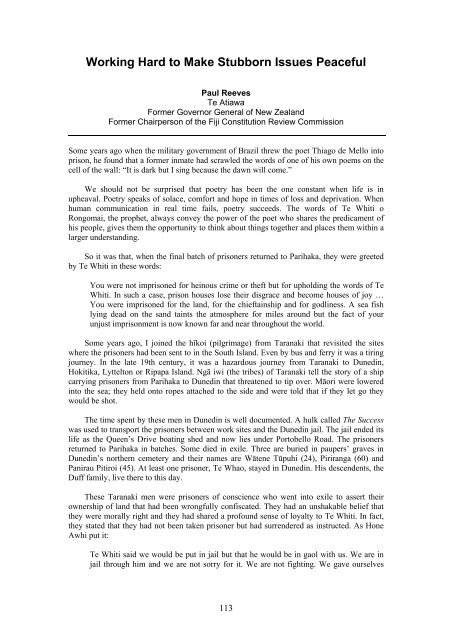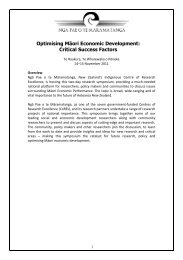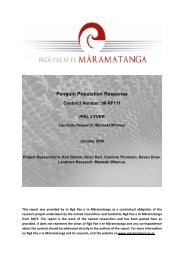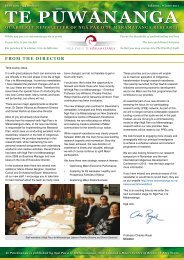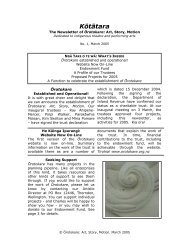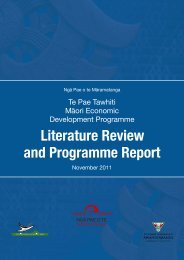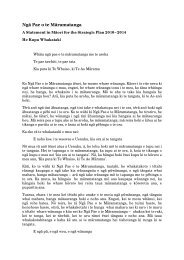- Page 1:
New Zealand’s Mäori Centre of Re
- Page 4 and 5:
Te Tatau Pounamu: The Greenstone Do
- Page 6 and 7:
MihiAnei rā a manawa e ngunguru, e
- Page 8 and 9:
Table of ContentsForewordJoseph Te
- Page 10:
Tikanga and Technology: A New Net G
- Page 14 and 15:
PART APRESENTATIONS BY INVITED SPEA
- Page 16 and 17:
Te Miringa jointly edited, with Gre
- Page 18 and 19:
plant’s cycle of life. Patricio i
- Page 20 and 21:
Through Puralia Consultancy, he has
- Page 22 and 23:
Opening AddressLinda SmithNgāti Aw
- Page 24 and 25:
system, they had a deeply entrenche
- Page 26 and 27:
Takaparawhau: Bastion Point:An Exam
- Page 28 and 29:
get us off our papakāinga (village
- Page 30 and 31:
eating burnt offerings. That was Ba
- Page 32 and 33:
mean that a lot of others were not
- Page 34 and 35:
Maungārongo: Non-Violent ActionTe
- Page 36 and 37:
He Poroporoakī ki a Te Hau-o-te-ra
- Page 38 and 39:
Restoring the Nation:Removing the C
- Page 40 and 41:
were expecting the manuhiri (visito
- Page 42 and 43:
When our students walked from Whaiw
- Page 44 and 45:
parents for a while and then said w
- Page 46 and 47:
A Journey Away from Violenceto a Pl
- Page 48 and 49:
But on the other side, the Australi
- Page 50 and 51:
tied to the idea of progress or the
- Page 52 and 53:
not provide any greater benefit to
- Page 54 and 55:
The foundation of the colonial proj
- Page 56 and 57:
Watson, I. (2008, in press). Sovere
- Page 58 and 59:
It is about knowing who we are, whe
- Page 60 and 61:
it acknowledges the imbalance of th
- Page 62 and 63:
food. Quick, quick!” We had some
- Page 64 and 65:
Harvesting Peace from a Field of Co
- Page 66 and 67:
international corporation by itself
- Page 68 and 69:
think it is a tradition to keep the
- Page 70 and 71:
A Jade Door: Reconciliatory Justice
- Page 72 and 73:
children. As early as seven-years o
- Page 74 and 75: owned only 90,000 acres. Since it w
- Page 76 and 77: A Māori Framework for Family Viole
- Page 78 and 79: that we talked about, we are consta
- Page 80 and 81: manamanaakitangamaraeorangapūteara
- Page 82 and 83: I have been schooled from when I wa
- Page 84 and 85: So, my work has been around liberat
- Page 86 and 87: Finally: peacemaking, reconciliatio
- Page 88 and 89: churns out crap and chalks up the n
- Page 90 and 91: “Indigenes” in Dialogue: Reflec
- Page 92 and 93: done three or four years ago, his c
- Page 94 and 95: Examples of the exclusion of Samoan
- Page 96 and 97: The first question resurfaced, espe
- Page 98 and 99: have inherited and continue to expr
- Page 100 and 101: principal home of whānau, hapū an
- Page 102 and 103: i Rangiātea, the seed broadcast fr
- Page 104 and 105: Preventing the Effects of the“Col
- Page 106 and 107: In Australia we have got big proble
- Page 108 and 109: Figure 3. View from Cape Barren Isl
- Page 110 and 111: communities and give our young peop
- Page 112 and 113: SemisiFor me, talanoa has been a pr
- Page 114 and 115: make decisions, you realize that yo
- Page 116 and 117: e lelei.” I will give an example
- Page 118 and 119: the great dreams of humankind must
- Page 120 and 121: stories maintain in a visible way t
- Page 122 and 123: From our perspective in contemporar
- Page 126 and 127: of argument rather than the argumen
- Page 128 and 129: Once again, Don McKinnon rang me up
- Page 130 and 131: Concluding AddressMichael WalkerWha
- Page 132 and 133: PART BVARIOUS PAPERS PRESENTED TO T
- Page 134 and 135: Rongoā Māori PracticeAlthough an
- Page 136 and 137: practice should be sustained is not
- Page 138 and 139: the transmission of knowledge, ackn
- Page 140 and 141: orangaPākehārākauritengaromi(rom
- Page 142 and 143: Indigenous Knowledge:Traditional Re
- Page 144 and 145: Colonial TraditionsHowever, the col
- Page 146 and 147: esponses can be more effective for
- Page 148 and 149: Table 33. Defining the problemsInte
- Page 150 and 151: ConclusionCurrent research and educ
- Page 152 and 153: O’Sullivan, D. (2007). Beyond bic
- Page 154 and 155: On the 19th anniversary of my mothe
- Page 156 and 157: teenager; I thought I was getting p
- Page 158 and 159: Traditional Knowledge and Decision
- Page 160 and 161: ather than rapid (Aquaculture New Z
- Page 162 and 163: the area of personal health and gen
- Page 164 and 165: Walker, 2005). This fuller expressi
- Page 166 and 167: e the best protection this country
- Page 168 and 169: Morgan, T. (2004, July). A tangata
- Page 170 and 171: “Our own” GameNowhere was the n
- Page 172 and 173: and Tonga rosters. By 2003, however
- Page 174 and 175:
Manu (Samoa)palagivanuayaqonarefers
- Page 176 and 177:
Indigenous Strategies for Self-Repr
- Page 178 and 179:
and the subject of much popular and
- Page 180 and 181:
year-old father of three from Taveu
- Page 182 and 183:
indigenous children, as nearly all
- Page 184 and 185:
He Kōrero mo tētahi o ngā Waiata
- Page 186 and 187:
Ko te nuinga o ngā waiata tawhito
- Page 188 and 189:
Rārangi 6:Ki taku mōhio, i whatun
- Page 190 and 191:
Brief Background on Australia’s P
- Page 192 and 193:
local institution official characte
- Page 194 and 195:
approved a new constitution that ma
- Page 196 and 197:
Kaupapa Māori Entrepreneurship:Tra
- Page 198 and 199:
New Zealand was and continues to be
- Page 200 and 201:
to existing systems and even result
- Page 202 and 203:
I describe ethnic fundamentalism or
- Page 204 and 205:
However, the following categories w
- Page 206 and 207:
Frederick, H., & Carswell, P. (2001
- Page 208 and 209:
He Kākano: Māori Views and Experi
- Page 210 and 211:
diagnosis (PGD). 2 Toi te Taiao (Bi
- Page 212 and 213:
Right Relationships with the Earth:
- Page 214 and 215:
EconomicsNeoclassical economics is
- Page 216 and 217:
EvaluationThere are flaws with many
- Page 218 and 219:
Many people will die, and many more
- Page 220 and 221:
Wackernagel, M., Wermer, P., & Gold
- Page 222 and 223:
The empirical research was carried
- Page 224 and 225:
esponsibilities as whānau, hapū (
- Page 226 and 227:
We teach Indigenous theories within
- Page 228 and 229:
For too long, however, indigenous p
- Page 230 and 231:
Indigenous Partnership Strategies i
- Page 232 and 233:
administrative level through to the
- Page 234 and 235:
continues to receive Touch funding
- Page 236 and 237:
kura kaupapa Māorimanamaraepapakā
- Page 238 and 239:
(youth) mātua (adults) to kaumātu
- Page 240 and 241:
A - focus, attention, driving force
- Page 242 and 243:
“Thinking of our students reminds
- Page 244 and 245:
kaiārahiguidekaimahiworkerkarakiaa
- Page 246 and 247:
Frameworks for Traditional Māori K
- Page 248 and 249:
Many authors have written about the
- Page 250 and 251:
Te WānangaWānangaTraditional Know
- Page 252 and 253:
Takepū: Principled Approaches to H
- Page 254 and 255:
activities. Therefore takepū can b
- Page 256 and 257:
process is for definitions and inte
- Page 258 and 259:
mauri tūmauri nohomauri matengāka
- Page 260 and 261:
associated with contemporary techno
- Page 262 and 263:
directing and developing technologi
- Page 264 and 265:
Are Mātauranga Māori and Emerging
- Page 266 and 267:
The Complementarity of Wānanga and
- Page 268 and 269:
We graduated as different people. T
- Page 270 and 271:
some unease about sex selection for
- Page 272 and 273:
Māori Grandparents:Raising Mokopun
- Page 274 and 275:
grandparents who were raising mokop
- Page 276 and 277:
on the numbers of Māori children w
- Page 278 and 279:
the ngākau which is recognized thr
- Page 280 and 281:
lost tūrangawaewae through the col
- Page 282 and 283:
An Indigenous Commentary on the Sta
- Page 284 and 285:
The Drive to Standardize Restorativ
- Page 286 and 287:
indigenous position would be to adv
- Page 288 and 289:
If our programmes are based on tika
- Page 290 and 291:
Rudin, J. (2003, October). Pushing
- Page 292 and 293:
are deteriorating due to the interv
- Page 294 and 295:
for Social Science (SPSS) program,
- Page 296 and 297:
Utilization of the Users’ Group F
- Page 298 and 299:
Gurung, H., & Harris, P. (1988, Aug
- Page 300 and 301:
Conflict in Western Nepal: Its Caus
- Page 302 and 303:
analysis (2005) showed that the mai
- Page 304 and 305:
eing paid as cadres in the party. B
- Page 306 and 307:
He Ara Whanaungatanga:A Pathway Tow
- Page 308 and 309:
Culturally Appropriate Research Met
- Page 310 and 311:
succession to land interests employ
- Page 312 and 313:
ways in which they wanted it presen
- Page 314 and 315:
ReferencesApou, M. (2003). Ko te ah
- Page 316 and 317:
Pupuruhia Tō Manawaroa: Holding St
- Page 318 and 319:
in kappa haka, they are expanding l
- Page 320 and 321:
heirlooms, such as patu pounamu, we
- Page 322 and 323:
proficient in marae etiquette) and
- Page 324:
ReferencesBiddulph, F., Biddulph, J


